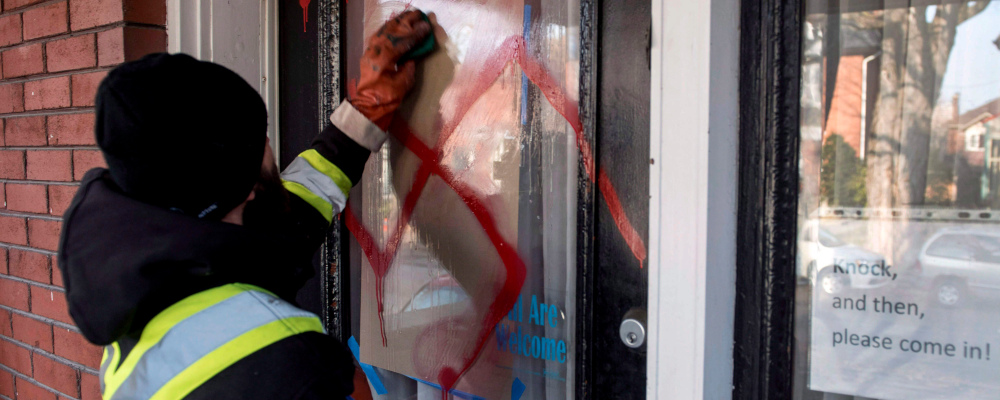I keep seeing on the news how incidents of anti-Semitism in Canada are on the rise. If one were to judge by what passes as news coverage these days it would seem this country is an anti-Semitic haven where xenophobia reigns supreme. I come from a Jewish family and think this is nonsense.
My grandparents were from eastern Europe and arrived here before World War I, which was a good thing or I may not be writing this. But to depict Canada as a bastion of racism—and let’s not confine this to anti-Semitism—is absurd. Before venturing down that road we should compare Canada to other countries (take your pick) and, all things considered, I think we come out pretty well. I would hazard a guess there are few if any nations as tolerant and open to diversity as this one.
That is not to say there aren’t crackpots among us. Indeed, there are, and in this day and age of social media they rear their heads on a regular basis. However, those who make decisions at the news desks of TV networks and mainstream media—it’s another ball of wax with other media where anything goes—seem to think anything above ground zero means we live in an intolerant society. Well, I have news for the news desks. Ground zero doesn’t exist and never did.
I got a good glimpse into anti-Semitism years ago when writing a newspaper column about the justice system. Ernst Zundel was a Toronto resident of German extraction and the world’s leading publisher of Holocaust denial. He was charged and it went to trial where Holocaust survivors had to testify about their wartime experiences. Zundel was convicted but this was overturned on a technicality and a second trial took place so those Holocaust survivors had to again take the witness stand. I wrote how ridiculous this was and make no mistake, the theme was that Canada was going easy on Mr. Zundel and the other Nazis who came here after the Third Reich went up in smoke. And a letter arrived at the newspaper I wrote for.
I was threatened by a neo-Nazi. He was picked up by police, charged, and incarcerated pending a hearing. As it turned out, he had a rifle with a night scope and a slew of other things. This was not his first run-in with the law. When things got to court I was asked to appear and read my column into the record.
“That’s a very controversial column,” the judge said. The charges against the defendant were thrown out and he was let go with the proviso that he writes no letters to any newspaper in the country for the next year. Harsh treatment but hey this is Canada.
As for Zundel, he was convicted at a second trial, but acquitted by the Supreme Court of Canada because of the Canadian Charter of Rights and Freedoms. The man’s rights were being abridged. He was eventually extradited to Germany where they are more serious than Canada has ever been about hate crimes; he got a five-year prison sentence, the maximum allowed under German law. Zundel died in 2017.And here’s a little-known fact about him: at the 1968 Liberal Leadership Convention that elected Pierre Trudeau as leader, Zundel offered himself as a candidate and even spoke at that gathering!
Let me say at this point that I grew up in north Toronto in an area with many Jews. Did I ever experience anti-Semitism? In Grade 7 a non-Jewish classmate told me that I killed Jesus. The husband of one of my wife’s friends was a buyer at a major retailer who confided that he only liked doing business with white people and Jews. When I was in residence at university my roommate explained how he got “Jewed” out of $10. When my wife and I were dating—she’s not Jewish—we had problems with her father. But racism can go two ways. I had a close friend who became an Orthodox rabbi in the U.S. After he was long gone to New York I visited his parents whom I knew well. Keep in mind these people were immigrants.
“I understand you married a non-Jewish girl,” my friend’s father said. “How could you lower yourself like that?”
I have never forgotten those words, and recall his stories about growing up and taking part in knife fights between Arabs and Jews. That was the world he came from. That was the life he came from. And he brought what prejudices he carried with him to Canada.
My wife and I have two kids and four grandchildren. Religion has never been an issue with us. Nevertheless, finding someone to marry us back then was no simple matter. My parents knew this Reform rabbi and suggested we see him. We did and he refused to marry us. We wound up getting married by a United Church minister and if that means it’s null and void after all these years then I’m a monkey’s uncle.
Over the years I’ve heard it all. That Jews control half the world’s wealth. That the murder of six million European Jews is a complete fabrication. And the age-old conspiracy about taking over the international order. Ultimately, people believe what they want to believe and there is always a direct correlation between ignorance and what is perceived as truth. As the level of ignorance goes off the charts truth becomes the proverbial first casualty of war. The fact is there are a lot of ignorant people out there. But is anti-Semitism—never mind anti-anything else—such a dire problem in Canada today? Relatively speaking? I think not.
I do media seminars and will take an actual interview to illustrate things. One that comes to mind was years ago when Avi Lewis had Ayaan Hirsi Ali on his CBC show On the Map after her best-selling book Infidel about her life as a Muslim woman was published to wide acclaim. The host argued there was rampant Islamophobia across North America and that Muslims, including here, felt under siege. But Ali disagreed.
“I think it’s highly exaggerated that Muslims living in America and the West are under siege,” she said. “If that were the case we know groups in history who were under siege and what they usually do is they leave. I don’t see any American Muslim leaving and going back to any Muslim country.”
She also added this gem: “I don’t find myself in the same luxury as you do. You grew up in freedom and you can spit on freedom because you don’t know what it is not to have freedom.”
Touché.

There is a lot of knee-jerk reaction in the country today about Jews being under siege. Blacks being under siege. Muslims being under siege. What have you. Again, judging by the news, it seems everyone and his or her brother are under siege. Fine. First Nations citizens aside, we are all from somewhere else so if you really feel that way I suggest you compare Canada with where you came from.
But people don’t do that. They just like to complain. Of course, there was a time when anti-Semitism was a bigger problem in Canada than it is today. What’s different now? Two things. First, the ascension of Donald Trump to the White House made prejudice, and with that rampant ignorance, vogue and even celebrated.
Second, and this goes in tandem with number one, we have the ease with which nutbars get the word out and I point my finger at social media, the social-media giants who can’t police themselves, and the government that lets it happen. But then government rarely if ever leads. It follows and reacts, and even then you’re lucky. There wasn’t a January 6th storming of the Bastille—make that the U.S. Capitol in Washington—until technology made it possible.
Despite the benefits the internet and social media bring us, I think the net effect of this stuff is negative. Harry Rakowski wrote an excellent piece on the ills of social media for The Hub and mentioned how Facebook “prioritized profits over the safety of its users and facilitated misinformation, hate, and calls for violence on its platform.” He went on to say that misinformation was valuable to the company’s bottom line and that such misinformation “gets six times more views than the truth.”
It’s like Big Tobacco. We discovered cigarettes were bad for your health and caused lung cancer. But at one time society condoned smoking and even encouraged it. Just have a look at any old movie from the 1940s or 1950s. Finally, the science took over and we learned the truth, but only at great cost.
Still, there is a deeper problem with social media. We have a generation that doesn’t know how to socialize. What’s more, I have doubts about their ability to do serious research. It seems to me the more information readily available to the masses the more ignorant the mass becomes. Why? When information is easy people become lazy and complacent, and that is where real racism festers. Today we are in desperate need of those who speak the truth and aren’t afraid to say it, but this requires two commodities that appear to be in short supply.
Honesty and guts.
Recommended for You

Ben Woodfinden: Lament for an ‘elbows up’ nation

Falice Chin: The ‘wild and weird’ Calgary Stampede

‘A celebration of the spirit of Alberta’: Ryan Hastman on the political, economic, and cultural importance of the Calgary Stampede

Michael Geist: Children accessing porn is a problem, but government-approved age verification technologies are not the answer



